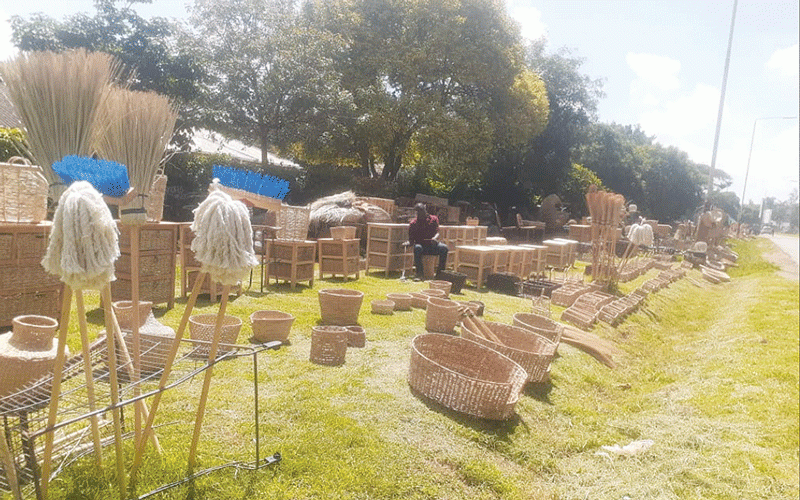
POMONA has been known by many people for its popular refuse dumpsite with residents complaining about the air pollution due to poor and ineffective management in which it had turned into sources of health hazards to people living within their vicinity.
However, there are some people like weaver Aaron Chimene (45) who are operating within the Pomona radius to the betterment of their wellbeing.
Falling in love with weaving when he was in his 20s, Chimene reckons the craft which he uses palm leaves (Murara) has been his source of livelihood for the past 22 years operating in the Pomona area.
Although sometimes his business is not profitable, Chimene has however, remained resolute to the trade.
Starting the craft
I was taught this weaving basket craft about 22 years ago by my brothers, who had been weavers for a very long time, immediately after my Ordinary Level. I was never bothered to look for a job because I had a skill.
I have never worked anywhere, this is what l do for a living. It is something that can be done by anyone as it does not need five Ordinary Level qualification. By seeing others doing you can learn and get the experience. We have been operating here for years and we moved from the other side because the road was being extended.
Weaving the baskets
- Zimbabwe fall to Afghanistan
- Zimbabwe fall to Afghanistan
- Overview: Zimbabwe’s 2021 sporting heroes and villains
- Muzarabani denied UAE clearance
Keep Reading
A lot is involved when weaving baskets, we plait them in different patterns. I use a combination of hand movements to push the weft thread over and under each of the warp threads making a tightly woven basket.
Different patterns are produced by raising different numbers of warp threads. The products that we have are side bed tables, wardrobes, hamper baskets, trays, laundry bins, chairs, stools and swings. We have introduced weaving with plastic on our items. Some of the work and patterns that we do are brought by customers and if l likes the design l also start to use the design going forward.
On small baskets we spend about an hour to finish and on other bigger crafts we can work two or three hours depending on the speed.
A basket is made by two people because the steel that we use is done by a welder and in some cases, we also make use of a carpenter, then the weaver.
‘It’s a job’
There are no jobs in Zimbabwe, and each one has her or his own specialisation and l see this (weaving) as something that l am capable of doing. We are far much better in living a decent life than other people who are formally employed.
This job has a lot of advantages because l am my own boss. My smallest basket costs US$8 and the bigger one US$60.
In everything that l do l am using my knowledge and when customers come to buy it means they have liked my work. I have taught a lot of people how to weave, including those that help me when l am overwhelmed and l am proud of that because they are earning a living.
If someone is able to weave, they have a talent that helps them to sustain their wellbeing because a talent cannot be stolen. All my children can weave and l am proud of them all.
Challenges
We do this in order to survive with our families and the biggest challenge that we are facing these days is declining business. We are not selling every time and we try by all means to have all things that are needed by customers, but we don’t get what we expert.
As a result, we don’t have fixed prices.
We are sometimes surviving through hand to mouth.
Sometimes customers think we over charge them, but that is not true as they have little or no knowledge about our work. Some think that we get our material in the rivers for free, but it comes from as far as Muzarabani, Gokwe, Chipinge and Mozambique. Some middlemen bring these to the market such as Mbare Musika market.
My family supports me very well and we are surviving through this job. I have four children and am able to look after them.
- Follow us on Twitter @NewsDayZimbabwe











